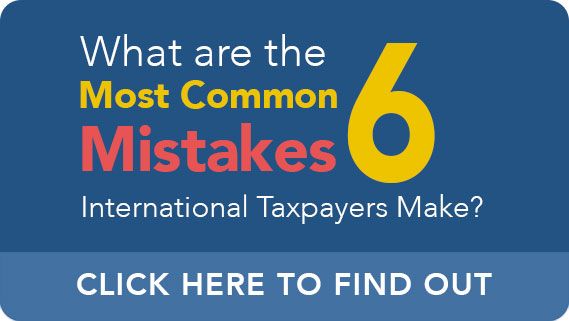Accountant for Non-Reported U.S. Tax Return Filer Changes
Few situations are as stressful as realizing you made a mistake on your tax return. With the many fines and penalties that the Internal Revenue Service (IRS) can levy against taxpayers, you may find yourself scrambling to figure out what you can do to fix the issue and avoid any negative repercussions. In many cases, those filing a return have opportunities to amend their paperwork, though there are certain mistakes that do not require a fix after the fact.
No matter who you are or where you are filing from, U.S. Tax Help can provide assistance with fixing any errors on your tax return. Our international tax experts have extensive experience with everything from botched financial reporting to changes in a taxpayer’s personal information or finances. If you or someone you know believes that a mistake was made on a tax return and would like to correct it before it becomes a problem, reach out the accountants at U.S. Tax Help right away; just visit us online or call (541) 362-9127 to set up your first consultation.
Requirements for Filing a Tax Return from Overseas
Expats and foreign citizens who have to file returns from abroad face more complicated filing and reporting requirements than most domestic taxpayers, and each bit of paperwork represents an opportunity for a mistake. Below are some of the filing requirements for U.S. taxpayers living overseas.
- Tax return: Moving out of the United States does not exempt a person from having to file a tax return with the IRS each year, even if none of that person’s income is generated in the U.S. Form 1040, the U.S. Individual Income Tax Return, is due to the IRS by April 15, though those living abroad qualify for an automatic two-month extension, making their de facto deadline to June 15. However, interest on any tax obligations begins to accrue on April 15, so delaying payment may not be wise.
- FBAR: The Report of Foreign Bank and Financial Accounts, better known as FBAR, must be sent to the Financial Crimes Enforcement Network by April 15, though this too comes with an automatic time extension that pushes the deadline to October 15. A person must fill out and submit an FBAR (FinCEN Form 114) if they have a stake in, or authority over, one or more accounts that together constituted greater than $10,000 at any point during the year.
- FATCA: The Foreign Account Tax Compliance Act (FATCA) requires that expats submit IRS Form 8938 with their tax return if they possess significant foreign financial assets. For single taxpayers, this means assets valued at greater than $200,000 at the end of the year or $300,000 at any point during the year; for married taxpayers filing jointly, those thresholds are doubled.
How to Fix an Error or Omission on a U.S. Tax Return
Though the IRS is not known for its compassion, there are is a surprising thread of forgiveness that runs through their policies regarding minor errors, or even a failure to file certain documents. For instance, the IRS may correct mathematical or clerical mistakes on your tax return, and there are cases where they will accept a return that is missing certain forms or attachments. If these circumstances apply to you, no actions are likely required to change your return. However, if you failed to report part of your income or need to change your deductions or credits, you will have to file an amended tax return.
To do so, you must file Form 1040X, Amended U.S. Individual Income Tax Return. The spaces on the form will ask for the information you previously reported along with any changes; if submitted after the April 15 deadline, do not include any interest or penalties with your payment, as these will be determined after your paperwork is filed. The deadline to file Form 1040X is three years after the original return was filed or two years after you paid the tax, whichever is later.
If you failed to submit a tax return at all, or if you neglected to include a financial disclosure through an FBAR or FATCA form, don’t panic; the IRS has streamlined compliance procedures for taxpayers living abroad. As long as you are not currently under investigation by the IRS and the mistake was not made on purpose, you can submit the missing paperwork to the government through these special procedures and avoid most of the fines and penalties you might otherwise have to pay. The process requires you to follow a series of 7-8 steps to qualify, however; the knowledge of a qualified tax expert can help ensure that you complete the procedures completely and accurately, which will save you money in the long run.
Call Our International Accountant for Non-Reported U.S. Tax Return Filer Changes
Just because you live in another country doesn’t mean you should have to stress out over filing your taxes, especially since there are a number of exclusions, exemptions, deductions, and credits available to expats that can significantly lower their tax burden. If you or someone you know is looking to file or amend documents with the IRS, the experts at U.S. Tax Help can provide assistance. Our team of skilled accountants has the knowledge and experience to guide you through the many forms, deadlines, and procedures you face as a U.S. taxpayer, and we are available anywhere in the world. To learn more about all our services and how we can help you avoid fines, fees, and penalties, visit us online or call (541) 362-9127 today.
